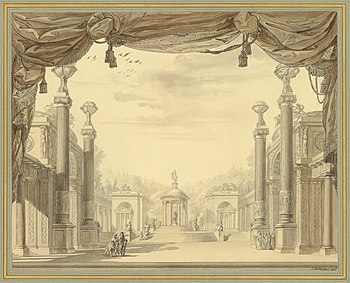
Alcestis or Alceste, was a princess in Greek mythology, known for her love of her husband. Her life story was told by pseudo-Apollodorus in his Bibliotheca, and a version of her death and return from the dead was also popularized in Euripides's tragedy Alcestis.
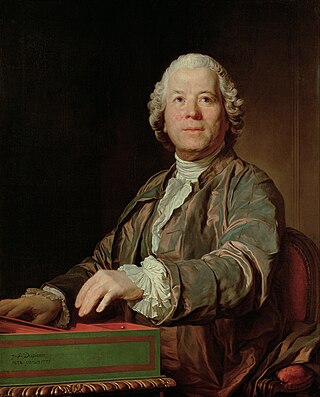
Christoph WillibaldGluck was a composer of Italian and French opera in the early classical period. Born in the Upper Palatinate and raised in Bohemia, both part of the Holy Roman Empire, he gained prominence at the Habsburg court at Vienna. There he brought about the practical reform of opera's dramaturgical practices for which many intellectuals had been campaigning. With a series of radical new works in the 1760s, among them Orfeo ed Euridice and Alceste, he broke the stranglehold that Metastasian opera seria had enjoyed for much of the century. Gluck introduced more drama by using orchestral recitative and cutting the usually long da capo aria. His later operas have half the length of a typical baroque opera.

Orfeo ed Euridice is an opera composed by Christoph Willibald Gluck, based on the myth of Orpheus and set to a libretto by Ranieri de' Calzabigi. It belongs to the genre of the azione teatrale, meaning an opera on a mythological subject with choruses and dancing. The piece was first performed at the Burgtheater in Vienna on 5 October 1762, in the presence of Empress Maria Theresa. Orfeo ed Euridice is the first of Gluck's "reform" operas, in which he attempted to replace the abstruse plots and overly complex music of opera seria with a "noble simplicity" in both the music and the drama.
Iphigénie en Tauride is a 1779 opera by Christoph Willibald Gluck in four acts. It was his fifth opera for the French stage. The libretto was written by Nicolas-François Guillard.

La vestale is an opera composed by Gaspare Spontini to a French libretto by Étienne de Jouy. It takes the form of a tragédie lyrique in three acts. It was first performed on 15 December 1807 by the Académie Impériale de Musique at the Salle Montansier and is regarded as Spontini's masterpiece. The musical style shows the influence of Gluck and anticipates the works of Berlioz, Wagner, and French Grand opera.

Opera seria is an Italian musical term which refers to the noble and "serious" style of Italian opera that predominated in Europe from the 1710s to about 1770. The term itself was rarely used at the time and only attained common usage once opera seria was becoming unfashionable and beginning to be viewed as something of a historical genre. The popular rival to opera seria was opera buffa, the 'comic' opera that took its cue from the improvisatory commedia dell'arte.

Idomeneo, re di Creta ossia Ilia e Idamante is an Italian-language opera seria by Wolfgang Amadeus Mozart. The libretto was adapted by Giambattista Varesco from a French text by Antoine Danchet, based on a 1705 play by Crébillion père, which had been set to music by André Campra as Idoménée in 1712. Mozart and Varesco were commissioned in 1780 by Karl Theodor, Elector of Bavaria for a court carnival. He probably chose the subject, though it may have been Mozart. The work premiered on 29 January 1781 at the Cuvilliés Theatre in Munich, Germany.
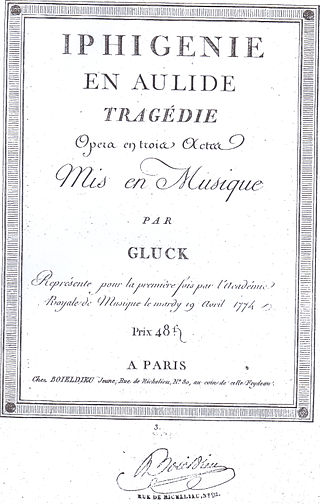
Iphigénie en Aulide is an opera in three acts by Christoph Willibald Gluck, the first work he wrote for the Paris stage. The libretto was written by François-Louis Gand Le Bland Du Roullet and was based on Jean Racine's tragedy Iphigénie, itself based on the play Iphigenia in Aulis by Euripides. It was premiered on 19 April 1774 by the Paris Opéra in the second Salle du Palais-Royal and revived in a slightly revised version the following year.
Paride ed Elena is an opera by Christoph Willibald Gluck. It is the third of Gluck's so-called reform operas for Vienna, following Orfeo ed Euridice and Alceste, and the least often performed of the three. Like its predecessors, the libretto was written by Ranieri de' Calzabigi. The opera tells the story of the events between the Judgment of Paris and the flight of Paris and Helen to Troy. It was premiered at the Burgtheater in Vienna on 3 November 1770.

Joseph Legros, often also spelt Le Gros, was a French singer and composer of the 18th century. He is best remembered for his association with the composer Christoph Willibald Gluck and is usually regarded as the most prominent haute-contre of his generation, though his acting is reputed to have been mediocre.
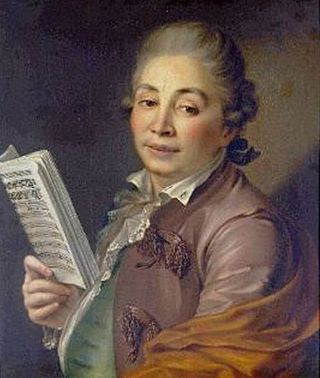
Vito Giuseppe Millico, called "Il Moscovita", was an Italian soprano castrato, composer, and music teacher of the 18th century who is best remembered for his performances in the operas of Christoph Willibald Gluck.
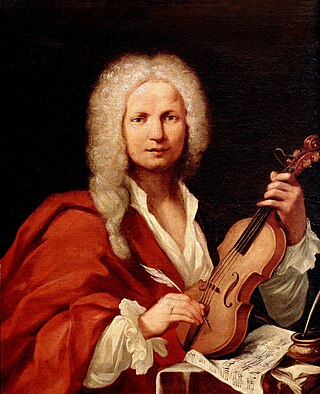
Ercole su'l Termodonte is a baroque Italian opera in three acts. In 1723, it became the sixteenth opera set to music by Antonio Vivaldi. Its catalogue number is RV 710. The libretto was written by Antonio Salvi. The opera was premiered on 23 January 1723 in Rome's Teatro Capranica. Due to a papal edict preventing women from appearing onstage in Rome, it premiered with castrati singing all the female roles. Vivaldi was both conductor and violin soloist.
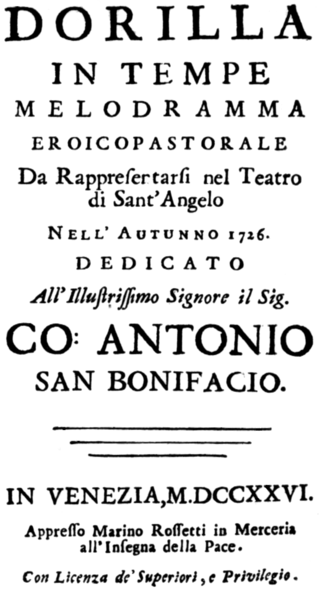
Dorilla in Tempe is a melodramma eroico pastorale or opera in three acts by composer Antonio Vivaldi with an Italian libretto by Antonio Maria Lucchini. The opera premiered at the Teatro San Angelo in Venice on 9 November 1726. Vivaldi later revised the opera numerous times for several different performances throughout the second half of his career.

Le feste d'Apollo is an operatic work by Christoph Willibald von Gluck, first performed at the Teatrino della Corte, Parma, Italy, on 24 August 1769 for the wedding celebrations of Ferdinand, Duke of Parma and Archduchess Maria Amalia of Austria.

Admeto, re di Tessaglia is a three-act opera written for the Royal Academy of Music with music composed by George Frideric Handel to an Italian-language libretto prepared by Nicola Francesco Haym. The story is partly based on Euripides' Alcestis. The opera's first performance was at the Haymarket Theatre in London on 31 January 1727. The original cast included Faustina Bordoni as Alcestis and Francesca Cuzzoni as Antigona, as Admeto was the second of the five operas that Handel composed to feature specifically these two prime donne of the day.
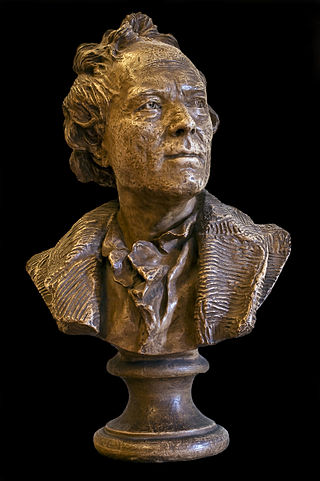
The following discography for Gluck's opera Orfeo ed Euridice is mainly based on the research of Giuseppe Rossi, which appeared in the programme notes to the performance of the work at the 70th Maggio Musicale Fiorentino in 2007, under the title "Discografia – Christoph Willibald Gluck – Orfeo ed Euridice ". Rossi's data has been checked against the sources referenced in the notes.
La danza is an opera by the composer Christoph Willibald Gluck. The title page describes it as a componimento drammatico pastorale in one act. It was first performed at Laxenburg near Vienna on 5 May 1755.
Antonia Bernasconi (1741–1803) was a German operatic soprano, appearing in opera houses in Vienna, Milan, Venice, Naples and London.
